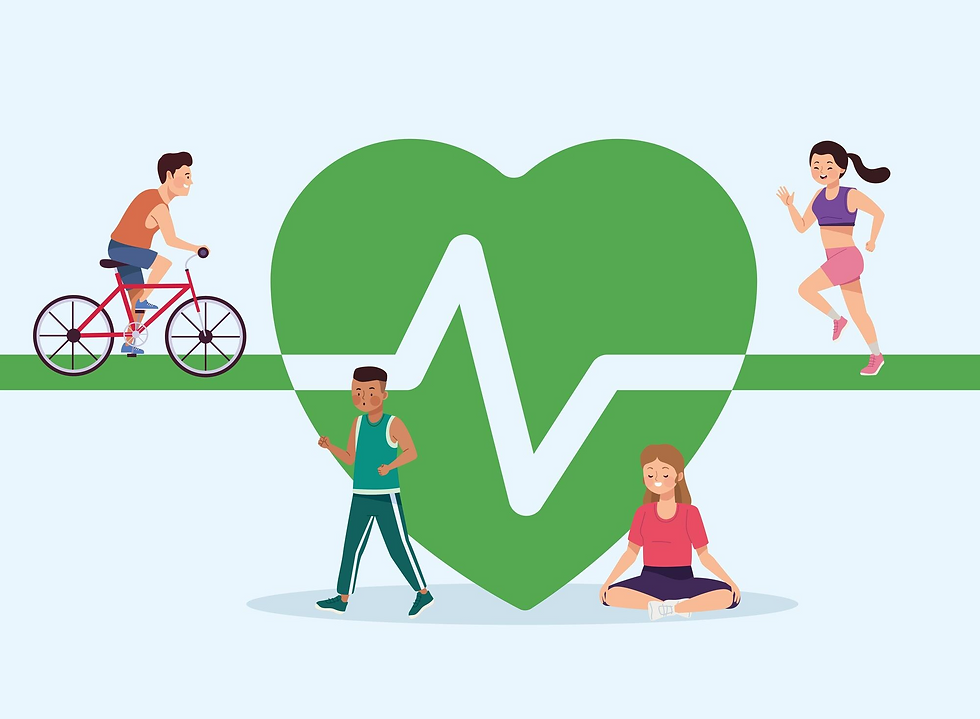Understanding Hyperinsulinemia
- Takudzwa
- Aug 19, 2025
- 3 min read

Hyperinsulinemia is a condition characterized by elevated levels of insulin in the blood. High levels of insulin in the blood are often a consequence of insulin resistance, where the body’s cells are less responsive to insulin. Less common causes of hyperinsulinemia are insulinoma (a rare tumor of the pancreas) and nesidioblastosis (overproduction of β-cells). Insulin is a hormone produced by β-cells in the pancreas and is responsible for regulating blood glucose levels, also known as sugar levels.
Genetic, socioeconomic, and environmental factors can also determine one’s chances of developing hyperinsulinemia. Studies have shown that racial differences in insulin secretion and clearance rates illustrate that Hispanic and black children have a higher likelihood of developing hyperinsulinemia.
Hyperinsulinemia can contribute to insulin resistance, creating a feedback loop. Insulin resistance typically results in increased insulin production for the body to maintain a healthy blood glucose level.
In a person who has excess insulin in their blood and doesn’t have insulin resistance, hypoglycemia (low blood glucose level) occurs. However, in the case of excess insulin due to insulin resistance, the elevated insulin levels don’t lead to low blood glucose levels.
Hyperinsulinemia is not the same as diabetes or hyperglycaemia; it is often associated with type 2 diabetes and can result in various metabolic conditions. Chronic hyperinsulinemia and insulin resistance cause high blood sugar levels, which lead to prediabetes and type 2 diabetes.
What symptoms are associated with hyperinsulinemia?
You may not have noticeable symptoms of hyperinsulinemia. However, if it leads to prediabetes, the following symptoms may be experienced:
· Skin tags
· Darkened skin on your back, armpits, and sides of the neck
· Changes in vision
Symptoms of type 2 diabetes include:
· Frequent urination
· Increased thrust
· Excessive hunger
· Extreme tiredness
· Blurred vision
· Headaches
· Slow-healing cuts and sores
· Vaginal and skin infections
If you experience any of these symptoms, it is crucial to contact a healthcare provider.

How is hyperinsulinemia diagnosed?
Hyperinsulinemia is difficult to diagnose since it often doesn't have any symptoms unless it results in prediabetes or type 2 diabetes. There is currently no common test to check for excess insulin levels, specifically given that insulin levels can vary greatly throughout the day. There is no single test used to directly diagnose hyperinsulinemia; healthcare providers consider several factors when assessing this condition, namely, family history, medical history, physical examination, blood test results (e.g., fast plasma glucose), and signs and symptoms.
Management and Treatment
How is hyperinsulinemia treated?
Given that not all factors that contribute to hyperinsulinemia, such as age and genetic factors, can be controlled, the primary treatment for hyperinsulinemia is lifestyle modifications. Treatment begins by treating underlying causes such as insulin resistance, insulinoma, and nesidioblastosis.
Lifestyle modifications include:
· Weight loss: Hyperinsulinemia can be improved by weight loss, so treating obesity with lifestyle modifications, medication, dietary changes, and bariatric surgery improves hyperinsulinemia.
· Exercise: Physical activity improves the body's sensitivity to insulin. This reduces insulin resistance, which is the most common cause of hyperinsulinemia. Exercise can also reduce obesity, which has been named as an underlying cause of this condition in some.
· Diet: Avoid consuming excessive amounts of carbohydrates and processed foods, which stimulate excess insulin secretion. Eat less unhealthy fat, red meat, and sugar. Rather, eat a diet of whole foods that is made up of more vegetables, whole grains, fruits, and lean poultry.
What should I do when diagnosed with hyperinsulinemia?
When diagnosed with hyperinsulinemia or any other condition related to insulin resistance, it is very important that you consult a healthcare professional regularly to ensure that your blood glucose levels are in a healthy range and that your treatment is effective. If you experience any symptoms associated with high blood glucose levels, contact your healthcare provider.
Conclusion
Hyperinsulinemia can be managed; one must have regular checkups with a healthcare provider. These check-ups will allow for early diagnosis. The earlier it is treated, the less likely it is for one to develop severe complications. Hyperinsulinemia doesn’t have any symptoms until it turns into prediabetes or type 2 diabetes, hence the preferred route of action is prevention and reversal of insulin resistance through maintaining a healthy weight, healthy diet, and regular exercise.
References
1 Abdul-Ghani, M., & DeFronzo, R. A. (2021). Insulin Resistance and Hyperinsulinemia: The Egg and the Chicken. The Journal of Clinical Endocrinology & Metabolism, 106(4), 1897–1899. https://doi.org/10.1210/clinem/dgaa364
2 B.Sc, S. R. (2010, June 23). Hyperinsulinemia Treatments. News-Medical. https://www.news-medical.net/health/Hyperinsulinemia-Treatments.aspx
3 Hyperinsulinemia: Symptoms, Treatments, and Diet. (2017, October 11). Healthline. https://www.healthline.com/health/hyperinsulinemia
4 Hyperinsulinemia: What It Is, Causes, Symptoms & Treatment. (n.d.). Cleveland Clinic. Retrieved 20 July 2025, from https://my.clevelandclinic.org/health/diseases/24178-hyperinsulinemi
5 Verhaeghe, J., & Bouillon, R. (2008). Chapter 45—Effects of Diabetes and Insulin on Bone Physiology. In J. P. Bilezikian, L. G. Raisz, & T. J. Martin (Eds.), Principles of Bone Biology (Third Edition) (pp. 983–999). Academic Press. https://doi.org/10.1016/B978-0-12-373884-4.00003-3
Assessed and Endorsed by the MedReport Medical Review Board






